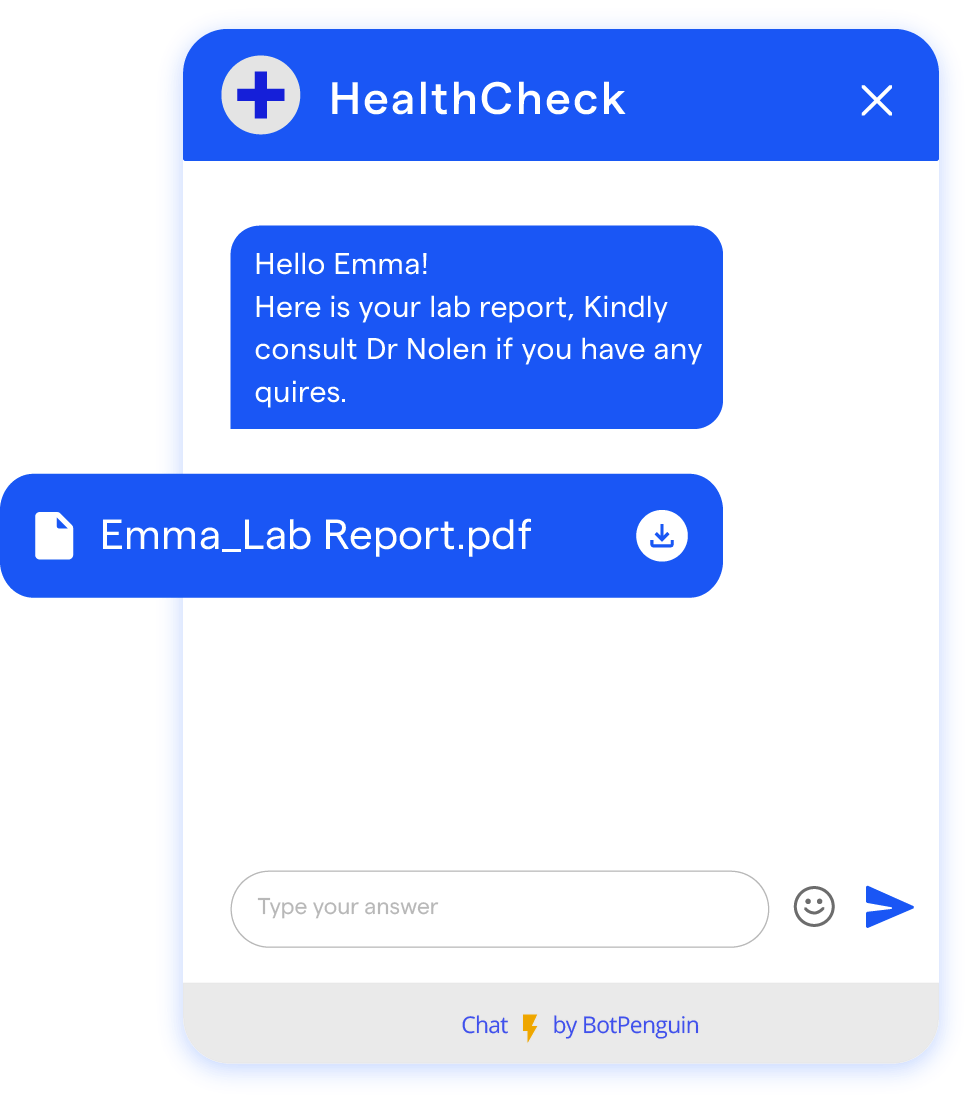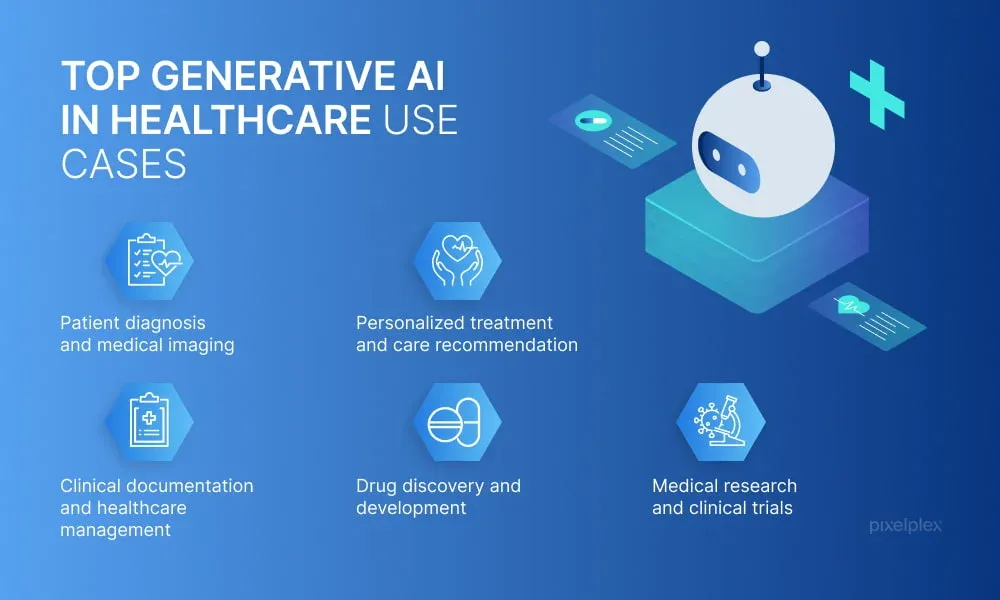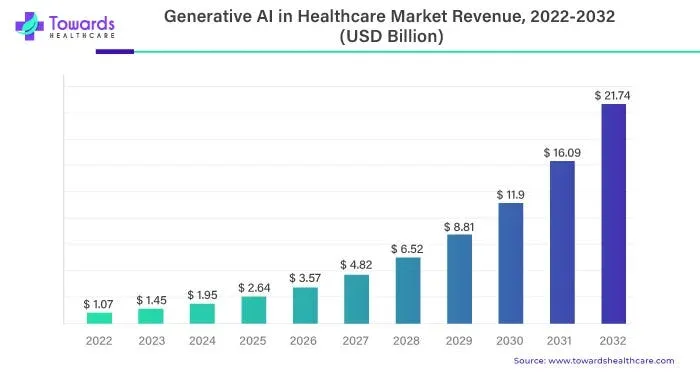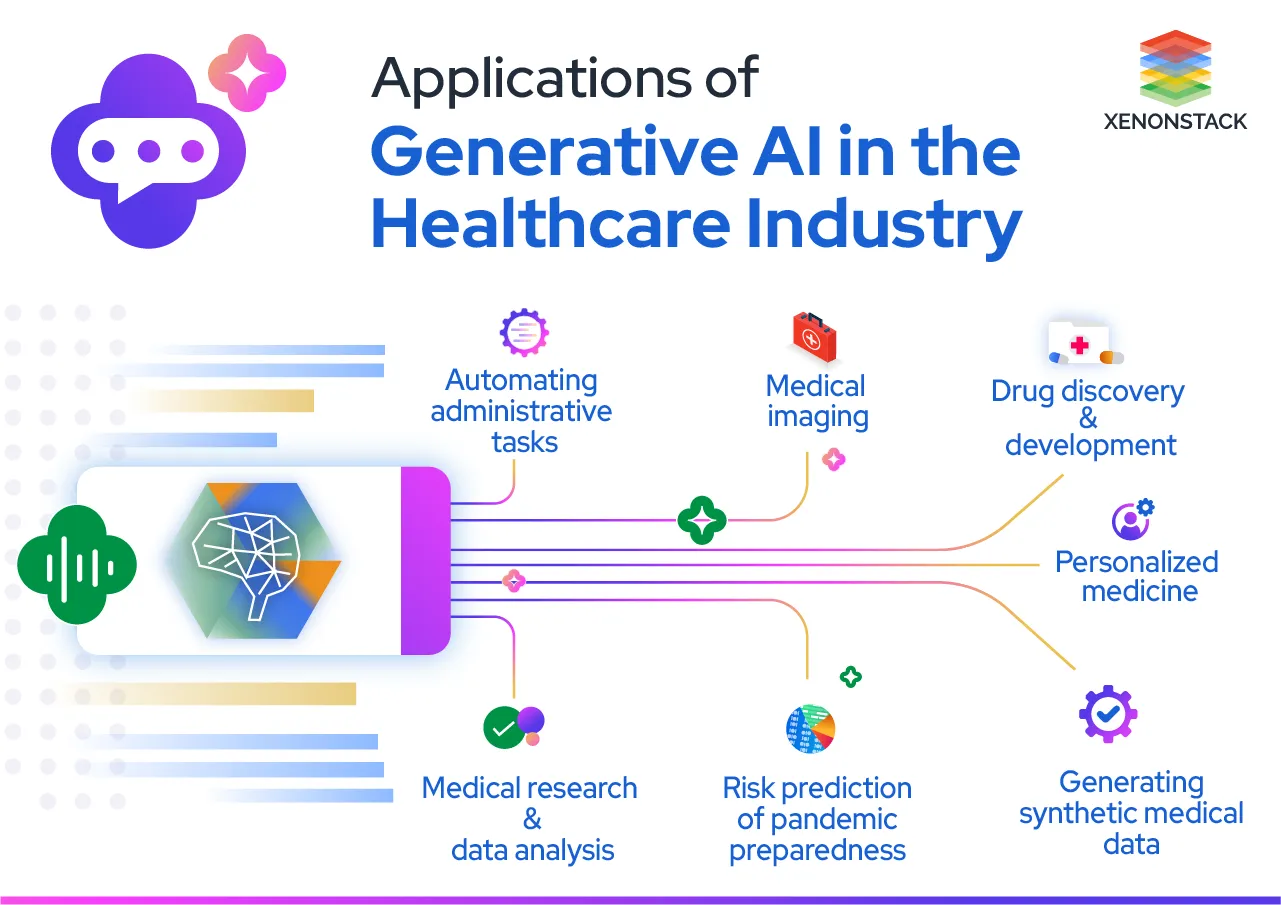Let's look into the world of Generative AI and its impact on healthcare.
This technology is set to change traditional healthcare methods. Imagine quicker diagnoses, tailored treatments, and remarkable drug discoveries becoming commonplace. It's quite thrilling, isn't it?
However, as with any groundbreaking technology, there are challenges to consider.
Ethical questions, data privacy concerns, and regulatory hurdles are part of the picture. But don't worry, we're in this together!
We'll see the advantages and disadvantages of Generative AI in healthcare, examining how it can enhance radiological analyses and improve clinical trials.
But we won't ignore the challenges. We'll face biases, explainability, and the constant need for transparency.
So, get ready for discovery. This journey will leave you informed, inspired, and eager for the future of healthcare. The revolution is here, and you're about to be a part of it.
Keep reading to understand how Generative AI is changing patient care. Let's get started!
Understanding How Generative AI Works in Healthcare
In healthcare, many established approaches and methods exist for diagnosis, treatment, and research.
However, recent advancements in Generative AI can potentially revolutionize the industry.

Generative AI: Demystifying its capabilities and applications in healthcare.
Generative AI is an area of artificial intelligence that involves creating complex models and algorithms that can autonomously generate new data, images, or audio.
In healthcare, this technology can model disease progression, generate synthetic patient data, and optimize clinical trial design.
Traditional Healthcare Methods: Exploring established approaches and their limitations.
Traditional healthcare methods, such as biopsy and imaging, can provide valuable information to doctors. However, these methods are often invasive, time-consuming, and expensive.
Additionally, the accuracy of these traditional methods can be limited by the experience and subjectivity of individual healthcare providers.
Why Compare? The potential impact of Generative AI and its need for evaluation.
While the potential impact of Generative AI in healthcare is significant, it is essential to compare it to traditional methods to determine its effectiveness.
Evaluation of this technology is crucial to ensure its accuracy, reliability, and usefulness in clinical settings.
Next, we will see the pros and cons of Generative AI in Healthcare vs Traditional Methods.
Diving into the Pros and Cons of Generative AI in Healthcare
Generative AI in healthcare promises faster diagnoses and personalised treatments.
But it also raises concerns over bias, privacy, and transparency.
Dive into the captivating pros and cons shaping this transformative technology's impact on patient care.
Pros of healthcare Generative AI
Let us see the pros of Generative AI in healthcare.

Faster and More Accurate Diagnosis
Generative AI models can rapidly analyze large volumes of patient data
Detect patterns that may be difficult or impossible for humans to identify
Leads to faster, more accurate diagnoses and earlier interventions
Personalized Medicine Advancements
Generative AI healthcare can analyze patient data to create personalized treatment plans
Based on unique patient needs and characteristics
Potential to reduce adverse side effects and increase treatment efficacy
Drug Discovery Breakthroughs
Generative AI can optimize the drug discovery process by predicting properties and efficacy of potential medications
Significantly reduces time and costs associated with drug development
Leads to more effective patient treatments
Enhanced Research and Clinical Trial
Generative AI can optimize clinical trials by predicting patient outcomes, identifying potential biases, and generating synthetic patient data
Improves accuracy and efficiency of clinical research
Leads to better treatments and patient outcomes
Suggested Reading-
Launching Healthcare Chatbot in 8 Easy Steps with BotPenguin
Cons of healthcare Generative AI
Let us see the cons of Generative AI in healthcare.

Ethical Considerations
Potential for bias in data and models used
Biased data can lead to biased outcomes and decisions, affecting patients
Transparency and accountability are crucial
Data Privacy and Security
Generative AI relies on large amounts of data, including sensitive patient information
Protecting patient privacy and ensuring data security is paramount
Responsible data handling practices and strong encryption are essential
Lack of Explainability
Challenge with Generative AI is the lack of explainability
AI models are often described as black boxes, making it difficult to understand how they arrive at conclusions
Explainable AI techniques being developed to address this
Regulatory Hurdles
Use of AI in healthcare is subject to various legal and ethical frameworks
Regulatory hurdles must be navigated to ensure compliance and ethical use of Generative AI
Considerations include data protection, patient consent, and liability
Next, we will cover some specific applications of Generative AI in healthcare.
Comparing Specific Applications of GenAI
Let's look at how Generative AI healthcare compares to traditional methods in specific healthcare applications.
Below are some of its applications.

How AI compares to traditional radiologists
When analyzing medical images, AI can provide several advantages over traditional radiologists.
AI models can quickly and accurately detect patterns or abnormalities in large radiographic images, assisting radiologists in diagnosing.
This can save time, reduce human errors, and improve the overall accuracy of diagnoses.
However, it's important to remember that AI should be seen as a supportive tool and not a replacement for radiologists' expertise and clinical judgment.
Examining AI's role in target identification and virtual screening.
Generative AI can significantly speed up drug discovery by assisting in target identification and virtual screening of potential drug candidates.
AI models can analyze vast amounts of data to identify target proteins and simulate the interactions of drug molecules with these targets.
This can help narrow the list of potential candidates for further testing, effectively accelerating the discovery of new drugs.
However, it's worth noting that traditional methods, such as in vitro and in vivo testing, are still necessary to validate and confirm the efficacy and safety of these potential drugs.
Highlighting AI-powered insights for tailored care.
AI has the potential to revolutionize personalized medicine by analyzing patient data and providing tailored treatment plans.
By integrating multiple data sources, AI models can identify correlations between genetic, lifestyle, and clinical factors and predict the most effective treatments for individual patients.
This approach can lead to more precise and targeted interventions, improving overall patient outcomes.
However, it's important to note that implementing AI-powered treatment plans should always involve healthcare professionals who consider the individual patient's unique circumstances and preferences.
Exploring AI's potential in design, recruitment, and data analysis.
AI can play a crucial role in optimizing various aspects of clinical trials. AI models can assist in designing trials by predicting patient outcomes, identifying potential biases, and recommending protocol adjustments—capabilities often developed in partnership with a clinical trial software development company.
Additionally, AI can aid in recruitment by analyzing electronic health records to identify eligible patients, streamlining the recruitment process.
Furthermore, AI can help analyze large volumes of trial data, enabling researchers to identify trends and insights more efficiently.
However, it's important to emphasize that AI should be seen as a tool that complements the expertise of researchers and healthcare professionals involved in clinical trials.
Conclusion
The future of healthcare is here, and Generative AI is leading the charge.
While the potential benefits are revolutionary, addressing ethical concerns, ensuring data privacy, and navigating regulatory hurdles are paramount.
Welcome to BotPenguin, where we bring the power of Generative AI to healthcare professionals like you. We invite you to approach this advanced technology with an open mind and a commitment to responsible use.
Our AI-powered platform is designed to make your work easier and improve patient experiences. It can help you create personalized treatment plans, improve clinical trials, and provide quick, accurate responses to patient queries. This way, you can save time and focus more on patient care.
We understand the importance of data privacy and security. That's why we handle all patient information with great care and in compliance with relevant regulations.
Join us in shaping the future of healthcare. Discover BotPenguin today and see how it can make a difference in your practice.
Suggested Reading:
Frequently Asked Questions (FAQs)
How does generative AI differ from traditional methods in healthcare?
Generative AI in healthcare uses algorithms and machine learning to analyze large amounts of patient data and create personalized treatment plans.
Traditional methods rely on clinical expertise and experience to make treatment decisions.
What are the benefits of using generative AI in healthcare?
Generative AI in healthcare offers benefits such as increased accuracy and efficiency in diagnosis and treatment planning, personalized treatment plans, improved patient outcomes, and the ability to quickly analyze large amounts of data.
What are the potential drawbacks of using generative AI in healthcare?
Potential drawbacks of generative AI in healthcare include ethical and privacy concerns, the need for large amounts of high-quality data for accurate decision-making, and the possible biases in algorithms that could lead to incorrect diagnoses or treatment decisions.
How do traditional methods compare to generative AI in healthcare?
Traditional methods in healthcare rely on clinical expertise, subjective analysis, and experience to make diagnoses and treatment decisions.
Generative AI in healthcare uses advanced algorithms to analyze large amounts of data, leading to more objective and personalized treatment plans.
Can generative AI replace traditional methods in healthcare entirely?
While generative AI in healthcare offers several benefits, it cannot entirely replace traditional methods.
Human expertise and clinical judgment are still crucial for making complex medical decisions and providing empathetic care to patients.


